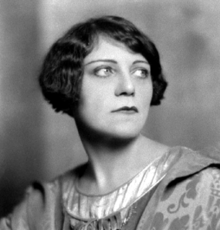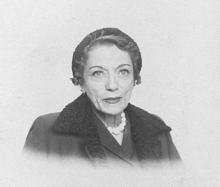Thyra Samter Winslow
Thyra Samter Winslow (March 15, 1886 – December 2, 1961) was an American short story writer, novelist, and film story writer, who published over 200 stories during her career, frequently for magazines such as The Smart Set, The American Mercury, and The New Yorker.
Thyra Samter Winslow | |
|---|---|
 | |
| Born | Thyra Samter March 15, 1886 |
| Died | December 2, 1961 |
| Resting place | Gate of Heaven Cemetery, Westchester County, NY |
| Occupation | Short story writer, novelist, film story writer |
| Years active | 1914–1953 |
| Spouse(s) | John Seymour Winslow (1912–1927) (divorced) Nelson Waldorf Hyde (1927–1938?) |
Early life
Thyra Samter was born to Louis Samter and Sara Harris Samter in Fort Smith, Arkansas on March 15, 1886[1] (though other sources list contradictory birth years[2][3][4][5]). Her parents had married in May 1885;[6] her family was Jewish, and her father ran a dry-goods store. At one point in her teen or early adult years, Samter wrote a society column for the Fort Smith Southwest American entitled "The Lady Clerk."[7]
After graduating from high school, Samter briefly attended the University of Missouri. In 1909, she moved to Chicago, working in vaudeville theatre and as a feature writer for the Chicago Tribune. In 1912, she married writer John Seymour Winslow. They divorced some time in 1927; Thyra Samter Winslow married engineer Nelson Waldorf Hyde in December of the same year.[4]
Writing career
Winslow began publishing stories in The Smart Set in 1914. By 1923, the magazine had published almost 100 of her stories, some under the pseudonyms Bruce Reid, Laura Kent Mason, Seumas Le Chat, Betting Calvert, and others.[8]
The first collection of Winslow's stories, Picture Frames, was published in 1923. She published her only novel, Show Business, in 1925. Doubleday published another collection of her stories, My Own, My Native Land in 1935; these stories were drawn from her writings for The New Yorker and other magazines, focusing on her home state of Arkansas.[8]
Hollywood
In 1935, Winslow went to Hollywood to work on treatments and screenplays. Her story "She Married Her Boss" was made into a film of the same name that year. According to The Hollywood Reporter, Winslow was assigned to work on the screenplay for RKO Pictures' 1936 film Night Waitress, but nothing more is known about her contributions.[9]
Winslow also contributed to the treatment for Four Daughters (1938), adapted from Fannie Hurst's short story "Sister Act." The film was nominated for five Academy Awards, including Best Screenplay, Best Picture, and Best Director.

Works
- Picture Frames (1923)
- Reprinted as Window Panes (1945)
- Show Business (1925)
- People Round the Corner (1927)
- Blueberry Pie and Other Stories (1932)
- My Own, My Native Land (1935)
- Chorus Girl (1945)
- Think Yourself Thin (1951)
- The Sex Without Sentiment (1954)
Themes
June Sochen compares Winslow to Fannie Hurst, noting that they both wrote about the Jewish immigrant family experience in New York City as "outsiders observing a foreign and dying culture."[10]
Recognition
Winslow made the "Roll of Honor 1918" in The Best Short Stories of 1918 and the Yearbook of the American Short Story.[5] She was listed in the 1978 World Almanac as one of eleven famous Arkansans.[7]
Edna Ferber called Winslow "a new master of the short story" in a blurb that appears on the cover of The Sex Without Sentiment.[11] Carl Van Doren anthologized one of Winslow's stories in Modern American Prose in 1934.[12] W. Somerset Maugham included her story "Orphant Annie" in his 1939 anthology Tellers of Tales.[13] Angus Burrell and Bennett Cerf included her story, "A Cycle of Manhattan" in An Anthology of Famous Stories (New York: The Modern Library,1936).
Death
Winslow suffered a fall in 1960 that left her paralyzed and hospitalized until her death on December 2, 1961.
References
- "United States Census, 1900".
- "Brazil, Rio de Janeiro, Immigration Cards, 1900 - 1965".
- "Thyra Samter Winslow | Jewish Women's Archive". jwa.org. Retrieved 2019-02-21.
- "Thyra Samter Winslow (1885?–1961) - Encyclopedia of Arkansas". www.encyclopediaofarkansas.net. Retrieved 2019-02-21.
- O'Brien, Edward Joseph Harrington; Foley, Martha (1919). The Best American Short Stories and the Yearbook of the American Short Story. Houghton Mifflin Company.
- "Missouri, County Marriage, Naturalization, and Court Records, 1800-1991".
- LeMaster, Carolyn Gray (1994). Corner of the Tapestry: a History of the Jewish Experience in Ar 1820s-1990s (c). University of Arkansas Press. ISBN 9781610751131.
- Boulden, Ben (2012-03-04). Hidden History of Fort Smith, Arkansas. Arcadia Publishing. ISBN 9781614234678.
- "AFI|Catalog". catalog.afi.com. Retrieved 2019-02-21.
- Sochen, June (1981). Consecrate Every Day: The Public Lives of Jewish American Women, 1880-1980. SUNY Press. ISBN 9780873955263.
- Winslow, Thyra Samter (1957). The Sex Without Sentiment: Short Stories Written With Understanddng But Without Sentiment. Abelard-Schuman.
- Doren, Carl Van (1934). Modern American Prose. Harcourt, Brace.
- Maugham, W. Somerset (William Somerset) (1939). Tellers of tales; 100 short stories from the United States, England, France, Russia and Germany. Internet Archive. New York, Doubleday, Doran & Co.
Bibliography
- Blanck, Jacob Nathaniel. Bibliography of American Literature. Vol. 9 (1955–1991).
- Encyclopaedia Judaica. Jerusalem: Keter Publishing House Ltd. 15 (1971): 1584.
- Glassman, Leo M., ed. Biographical Encyclopaedia of American Jews. New York: Maurice Jacobs & Leo M. Glassman, 1935.
- Obituary. The New York Times, December 3, 1961, 88:4
- Simons, John, ed. Who’s Who in American Jewry, Volume 3, 1938–1939. New York: National News Association, Inc., 1938. 1144.
- Who’s Who in America 30: 1958–1959 (1938): 3024
- Who Was Who in America. Volume 4.
Archival sources
- Thyra Samter Winslow Materials, 1900–1970. Special Collections. University of Arkansas Libraries, Fayetteville, Arkansas.